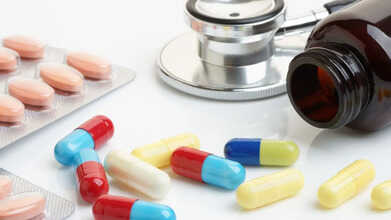- Health Conditions A-Z
- Health & Wellness
- Nutrition
- Fitness
- Health News
- Ayurveda
- Videos
- Medicine A-Z
- Parenting
- Web Stories
Why Is This Doctor Alerting Heart Patients Using Beta Blockers or Vasodilators?

Credits: Canva
Dr Punam Krishan has issued a caution to anyone taking certain medications for heart problems or circulation issues. Speaking on today’s (November 4) episode of the BBC talk show Morning Live, the NHS GP urged viewers to consult a doctor if they notice symptoms while on medication that could easily be mistaken for something minor.
As colder weather sets in, people are being advised to watch for warning signs that can be overlooked simply because of the low temperatures. Feeling cold is normal in winter, but consistently feeling chilly, especially in your hands and feet, while indoors or layered up should not be ignored, as certain medications can make you more vulnerable to these “hidden” problems.
Why Feeling Cold Could Signal Something Serious
Talking to hosts Gethin Jones and Helen Skelton, Dr Punam explained: “In winter, we all feel colder, but some more than others. We all have different cold thresholds. If you feel unusually cold indoors, when you’re wearing layers, or when the heating’s on, and it’s a new change, it’s worth checking out.”
She added, “This kind of cold could point to an underlying health issue. It’s not just feeling a bit chilly, it’s something that shouldn’t be ignored.”
Dr Punam also noted that as we age, our bodies naturally lose muscle mass and fat insulation, which keep us warm. Slower metabolism can also make it harder to maintain body temperature.
Symptoms to Watch For
Dr Punam advised that cold sensations accompanied by other signs, such as pain, tingling, numbness, weakness, stiffness, or changes in skin colour, should prompt a visit to the doctor.
Among common causes she encounters in her practice are iron deficiency and anaemia. “Low iron means the body doesn’t have enough healthy red blood cells to deliver oxygen throughout the body. Blood flow is prioritized to vital organs, so extremities like hands and feet feel the cold the most. It’s a simple blood test, easy to diagnose, and straightforward to treat, but should not be ignored,” she said.
Another condition to be mindful of is an underactive thyroid, which can slow metabolism and make someone feel excessively cold. Raynaud’s disease was also highlighted as a condition that can affect temperature regulation.
Dr Punam further cautioned people with heart disease, peripheral artery disease, high blood pressure, and diabetes, particularly advanced diabetes, because these conditions can impact blood flow and nerve function, leaving hands and feet unusually cold. “If any of this sounds familiar, speak to your doctor,” she emphasized.
Medications That Can Affect Body Temperature
Dr Punam listed several medications that can interfere with how the body regulates heat, making it especially important to consult a doctor if you notice unusual coldness. These include:
- Diuretics
- Antidepressants
- Vasodilators
- Beta blockers
Diuretics, also called water tablets, help the body remove excess salt and water by increasing urine production. They are commonly prescribed for high blood pressure, heart failure, or fluid retention (oedema).
Diuretics work by influencing kidney function, causing the body to filter more salt and water into the urine. While feeling cold, particularly in hands and feet is a possible side effect, it is less common than others such as frequent urination or dizziness.
What Are Vasodilators and Beta Blockers?
According to the National Institutes of Health, vasodilators are medications that relax and widen blood vessels to help lower blood pressure. Beta blockers are drugs that reduce the effects of hormones such as adrenaline, slowing the heart rate and lowering blood pressure.
Some beta blockers, called vasodilating beta blockers, combine both actions. They not only slow the heart but also help relax blood vessels, either through mechanisms like alpha-1 blockade or by boosting nitric oxide production.
How Vasodilators and Beta Blockers Can Make You Feel Cold
Vasodilators may leave you feeling chilly because they direct more blood toward the skin. This increased blood flow helps the body release heat and lower core temperature. As more heat escapes through the skin, it can make your hands and feet feel unusually cold.
Beta blockers, often prescribed for conditions like anxiety, high blood pressure, or palpitations, can also cause cold extremities. This happens because the medication affects how blood circulates to your hands and feet.
Dr Punam cautioned: “Medications can play a big role. If you’ve recently started one and notice that you’re constantly feeling cold, it could be a side effect. In many cases, we can adjust your treatment to help.”
Your Daily Work 'Grind' Is Ruining Your Heart Health, Cardiologist Explains How These Daily Habits Affect Your Heart

(Credit-Canva)
Recently, we are seeing a rise in ‘grind culture’. People are encouraged to pack their days with work and be as productive as possible to secure future success. However, did you know that chasing this success could come at the cost of your heart's health? Dr. Dmitry Yaranov, MD, a cardiologist, who often shared important health advice and knowledge on Instagram videos, explained posted about how as a practicing healthcare professional, there are many heart facts that he wished his patients knew about.
Things we often perceive as important for our careers can come at the cost of our mental and physical health. By not realizing the value of their health and ignoring their limits, people often stretch themselves too far, which can result in reaching a breaking point.
In a recent video posted with the text, “After treating thousands of patients with heart failure this are the things I wish more people knew before it was too late” in the caption he listed 6 hard facts that most people ignore.
6 Habits That Are Leading You To Heart Failure
In the caption Dr. Yaranov explained that cardiovascular health involves much more than just hitting the gym and eating salads. Your heart health is fundamentally tied to sleep, stress management, environmental factors, access to resources, and even the state of your gut. Fix the foundation, not just the numbers.
Sleep Deprivation is Dangerous
Sleeping only six hours nightly and pushing yourself is a serious threat, not a badge of honor. This chronic sleep loss significantly raises your long-term risk of developing severe conditions like heart failure, having a stroke, or experiencing sudden cardiac death. Your body needs rest to recover.
Air Quality Hardens Arteries
Commuting daily in heavy traffic means breathing exhaust and particulate matter. This consistent exposure to air pollution does more than irritate your lungs; scientific studies confirm it literally hardens your arteries, increasing your risk for major cardiac events over time.
Stress Causes Overload
If you are always stressed and simply "pushing through" without managing the pressure, your body is producing too much cortisol. This hormonal overload leads to persistent high blood pressure and widespread inflammation, key factors that severely damage the cardiovascular system.
Gum Health Impacts Heart Health
Ignoring routine dental care and having gum disease creates chronic infection in your mouth. This persistent gum disease results in more body-wide inflammation, which is directly linked to a significantly higher risk of heart attack and other cardiovascular problems.
Food Access Matters
Even if you have the best intentions to eat well, living where healthy food is hard to find (a food desert) makes it difficult. This lack of access to nutritious options leads to worse cardiac outcomes, proving that environment, not just personal willpower, shapes your health.
Gut Health Affects Vital Signs
The state of your digestive system should not be ignored. The millions of bacteria in your gut microbiome play a critical, unrecognized role in helping your body regulate blood pressure and cholesterol levels. You must consciously feed your gut bacteria the right way.
Can A Daily Low-Dose Aspirin Protect Diabetic Patients From Heart Disease? Here’s What Research Shows

Credits: Canva
For millions living with Type 2 diabetes, every doctor’s appointment comes with a familiar worry: How can I prevent another heart attack or stroke? A new study shared at the American Heart Association’s Scientific Sessions 2025 suggests that one simple, everyday pill might offer extra protection.
Researchers tracked people with Type 2 diabetes who faced moderate to high cardiovascular risk and discovered that those who regularly took low-dose aspirin had lower chances of heart attack, stroke, and death compared to those who didn’t take it.
Also Read: Air Quality Numbers Explained: What Each AQI Level Really Means And When It’s Safe To Step Outside
Low-Dose Aspirin May Lower Heart Risk in People With Diabetes
Adults with Type 2 diabetes (T2D) and an increased risk of cardiovascular disease (CVD) who took low-dose aspirin were less likely to experience a major heart event, including heart attack, stroke, or death, than others with similar risk levels who did not use aspirin, according to findings presented at the American Heart Association’s Scientific Sessions 2025.
For the study, researchers reviewed the health records of nearly 11,700 adults with type 2 diabetes and a high risk of heart disease who were part of the University of Pittsburgh Medical Center network, which spans over 35 hospitals and 400 outpatient clinics across Pennsylvania, Maryland, and West Virginia.
Also Read: Taking Ozempic, Wegovy, or Mounjaro? Experts Warn Of Rare But Severe Reaction
The key findings were:
- According to the study, adults with Type 2 diabetes who took low-dose aspirin had a lower rate of heart attack (42.4%) than those who didn’t (61.2%).
- The stroke risk was also reduced for those on a low-dose aspirin routine (14.5% vs. 24.8%), as was the risk of death from any cause within a decade (33% vs. 50.7%).
- Any level of aspirin use appeared linked to fewer heart attacks and strokes, with the strongest protection seen among those who took it most consistently.
- In subgroup analyses, low-dose aspirin use lowered cardiovascular risk regardless of participants’ HbA1c levels (a measure of blood sugar control). However, the benefit was more pronounced among those with lower HbA1c levels, suggesting better-managed diabetes led to stronger protection.
“People with Type 2 diabetes and higher cardiovascular risk who reported using low-dose aspirin were significantly less likely to experience heart attack, stroke, or death over ten years than those who didn’t,” explained Dr. Aleesha Kainat, clinical assistant professor of medicine at the University of Pittsburgh Medical Center. “That benefit was greatest for people who took aspirin regularly throughout the follow-up period,” she added.
What Are the Risks of Low-Dose Aspirin?
The U.S. Preventive Services Task Force advises adults over 60 not to take daily low-dose aspirin as a preventive measure for heart disease. The reason is that, while the medication can help reduce clot-related events, it also increases the risk of bleeding, especially in older adults.
“Although aspirin is often seen as harmless for most adults, it carries real risks, including potentially serious bleeding complications, particularly in older individuals,” noted a report from Healthline.
Recent evidence also suggests that daily aspirin may not benefit older adults unless they have already experienced a major cardiac event such as a heart attack.
Neurologist Reveals 3 Ways You Are Hurting Your Health When You Sleep Less Than These Many Hours

(Credit-Canva)
In a recent post, a neurologist reveals that losing sleep doesn’t just make you feel ‘sleepier’ but can have severe effects on your health as well.
Sleep deprivation is not uncommon. About one in five people in the UK are not getting enough sleep, according to Mental Health UK. They state that 66% of adolescents explain how poor sleep negatively impacts their mental health, and 37% of adults explain that their work is causing them to lose control over how much sleep they are having. Most people know how lack of sleep can affect their health; however, many times pre-existing health conditions can also be the cause of their sleep deprivation.
Whether you are sleeping less due to work or stress, it is very important to get help with it as soon as possible. Posting on social media X, Dr Sudhir Kumar, a Hyderabad-based neurologist, explained how sleep deprivation puts your body at risk, not just by harming your mental/psychological well-being but also puts you in life-threatening danger.
What Happens To Your Body When You Sleep Less?
Dr Sudhir Kumar explains that getting less than 4 hours of sleep for even just one night is a big deal. It has major, noticeable effects on your memory, how well you pay attention, and your ability to drive safely. In fact, being sleep-deprived is similar to being slightly drunk. This isn't just a feeling; it's proven by science.
3 Ways Less Sleep Is Hurting Your Health
In the post, Dr Sudhir listed 3 key ways your health is affected when you sleep less than 4 hours at night.
Memory Becomes Muddled
When you don't sleep enough, your memory takes a huge hit. Working Memory is a part of your memory you use for quick thinking, like solving a problem, making a decision, or remembering a phone number just long enough to dial it etc., is called working memory. When you're severely tired, this working memory drops dramatically, making simple tasks feel hard.
The key areas in your brain that build and pull up memories like the prefrontal cortex and hippocampus actually show less activity when doctors look at them with brain scans. They aren't working as hard as they should be.
Because of these changes, you will likely find it difficult to learn new things, keep up with a fast conversation, or remember details you were taught earlier that day.
Focus and Alertness Fades
Your ability to concentrate and stay alert is unreliable when sleep deprived. You will start experiencing microsleeps, which is when you can experience tiny, involuntary lapses at attention. You might literally doze off for a few seconds without even knowing it, especially when doing something boring or repetitive.
When your brain gets tired, leading to slower reaction times and a general feeling of mental fatigue. This makes it much harder to focus for long periods or try to do two things at once.
You tend to make more impulsive, which is quick, not well-thought-out decisions. As a result, the number of mistakes you make shoots up sharply.
Driving Becomes Risky
Driving when severely tired is dangerously similar to driving drunk. If you drive after sleeping less than 4 hours, your performance behind the wheel is like that of someone with a Blood Alcohol Concentration (BAC) of 0.08%. This is the legal limit for drunk driving in most places!
You have a much higher chance of drifting out of your lane, taking too long to hit the brakes, or missing traffic signs or lights entirely.
Research proves that drowsy driving causes thousands of car accidents every year. Sometimes, the driver doesn't even remember the crash because they were experiencing one of those dangerous microsleeps.
Not getting enough sleep is like putting your brain under the influence of alcohol. It messes up your attention, memory, and physical coordination.
The important rule is this: Do not drive or use heavy machinery if you have slept for less than 4 hours. Your ability to react quickly and make smart, safe decisions cannot be trusted.
© 2024 Bennett, Coleman & Company Limited

